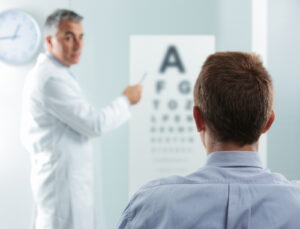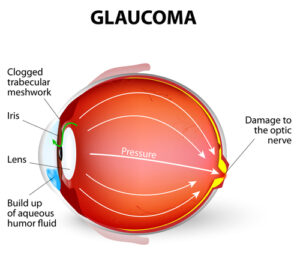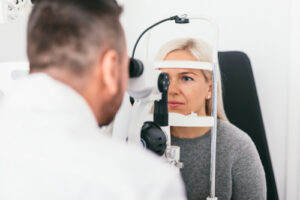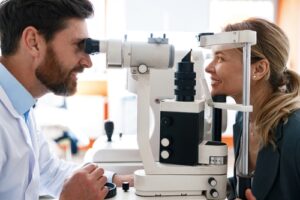Do you remember the last time you saw your ophthalmologist? If it was at least a year or more ago, or your vision is blurry, it’s been too long.
But you shouldn’t only schedule an appointment to see your eye doctor when you are concerned about your vision or need to update your prescription. Regular exams are a crucial part of keeping your eyes healthy.
You’ll receive the reward of a lifetime of clear vision and healthier eyes when you check your eyes consistently. If you’re unsure when to schedule your next appointment, keep reading to find out how often you should see your ophthalmologist!
What Does an Eye Exam Involve?

When you think of checking your eyes, you may think of dilated pupils and reading letters off a chart. While these are part of any routine exam, a visit with your ophthalmologist involves more than a basic test.
Your appointment will typically start with a discussion of your medical history. Your eye doctor needs to understand your medical history about your eyes and health, including any medications you may be taking.
They will also ask you if you have any concerns about your vision or if you’ve noticed any recent changes. You will read off an eye chart, one eye at a time, so your eye doctor can see how well you can perceive objects at various distances.
They will have you sit in front of a machine called a phoropter. You’ll look through different lenses and be asked which is clearest. This is how your prescription is determined.
At Dell Laser Consultants, our comprehensive exams evaluate many different parts of your eye. Using a variety of tests and methods of evaluation, your ophthalmologist will carefully examine your:
- Pupil
- Eyelid
- Cornea
- Iris
- Lens
- Retina
- Optic nerve
- Eye muscles
- Peripheral vision
You can expect your exam to take about an hour to complete. Once you leave our office, you can trust that your eyes have been thoroughly assessed.
Why are Eye Exams Important?

Regular exams are one simple but effective way to prevent concerning eye conditions and keep your eyes healthy at any age. The sooner you can receive a diagnosis of an eye condition, the earlier you can start treatment. Earlier treatment usually also means a better outcome.
Many patients may not even realize they have an eye condition until it’s something that their ophthalmologist spots the first signs of during their eye exam. A classic case of this is glaucoma, which is a condition that has few if any recognizable symptoms in the early stages.
However, it’s an eye condition that can lead to permanent and irreversible vision loss. During a comprehensive eye exam, your eye doctor can detect early signs of glaucoma and other conditions.
They’ll evaluate your peripheral vision since this is one of the first parts of your eyesight that glaucoma affects. They’ll also test the pressure of your eyes, as increased intraocular pressure (IOP) can indicate glaucoma.
Eye exams are more than eye care. They are also a preventative measure. When you stay up to date and regularly schedule eye exams, you help ensure your vision stays vital for a long time.
How Often Should You Get an Eye Exam?

The answer to the question of how often you should see your ophthalmologist is not the same for everyone. The frequency of when to schedule eye exams depends on a few factors. These factors include age, eye health, and family medical history.
How often children should see an ophthalmologist will change as they grow and age. Infants should have a comprehensive eye exam with an ophthalmologist if they are born early, have any signs of eye disease, or have a family history of eye diseases that develop during childhood.
The American Academy of Ophthalmology recommends that you have children screened for eye issues in their first year. They should have another screening between one and three, between three and five, and again at five.
Children should also get referred to an ophthalmologist for a comprehensive eye exam as necessary. By the time they start school, they should have an eye exam every two years.
Adults should have an eye exam with an ophthalmologist once in their twenties and twice in their thirties. However, if you have refractive errors and wear glasses or contacts, you must schedule annual eye exams.
Annual eye exams ensure that your prescriptions are up to date, and you can make any necessary modifications if your vision changes. You should also schedule an appointment for an eye exam immediately if you experience an eye injury, infection, or sudden changes in your vision.
Why Comprehensive Eye Exams are Important After Turning Forty

When you turn 40, it’s time to get a comprehensive eye exam. Your forties is when many early signs of ocular conditions begin to appear.
However, if you have an eye condition, diabetes, or high blood pressure, or if high-risk eye conditions run in your family, you should get a comprehensive eye exam sooner. Your eye doctor will let you know how often you should schedule eye exams to keep your eyes healthy, no matter your risk level.
If you are 65 or older, you should see your ophthalmologist yearly. To stay informed and on top of any potential age-related eye conditions, you should schedule eye exams no less than every two years. These conditions include cataracts, glaucoma, and age-related macular degeneration.
Depending on your risk factors and what condition your vision is in, your ophthalmologist may recommend more frequent exams. Be sure to schedule appointments as they suggest to maintain your healthiest vision.
Are you due for a visit with your ophthalmologist? Schedule an appointment at Dell Laser Consultants in Austin, TX, today! There’s never been a better time to make your eyes a priority than right now!





